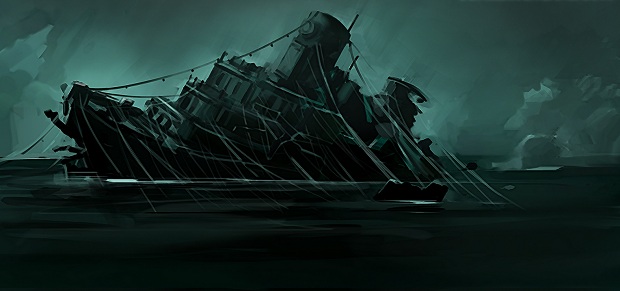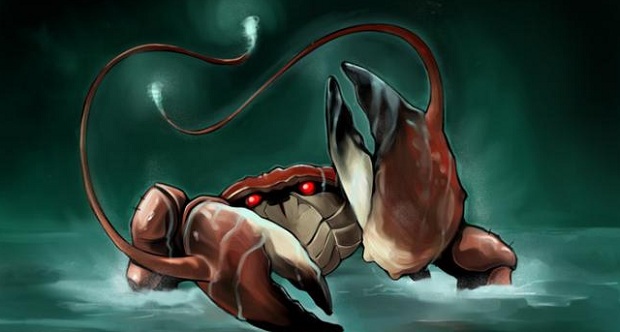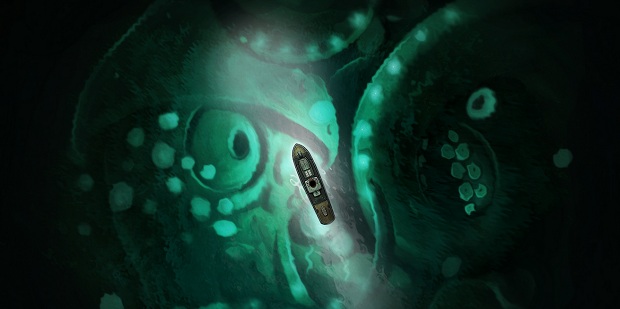Lyrical Ballast: Impressions Of A Sunless Sea
Rime and Reason
We’re deep down now, deep down where dreams and figments tumble and churn together like silt, deep down in sleep, where pain and sorrow fall drop by drop into the Sunless Sea, and wisdom comes in whispers of text and through the rubbery fronds of some ancient lifeform. Now in Early Access, Sunless Sea is the first ‘proper’ game from Failbetter, the clever-clogs creators of Fallen London and the Story Nexus platform. I've been navigating its strange shores for the past few days.
It is, as I’d hoped and expected, beautifully written and intelligently constructed, although the transition to browser-based (mostly) text adventure to top-down trading, fighting, exploration game hasn’t been quite as smooth as the glassy lakes of Titan. The leaks in the hull are easily corked though and the ship is a magnificent thing despite its flaws.
If you aren’t aware of Fallen London, I’ll gently refer you to my previous articles on the subject. Sunless Sea isn’t a sequel – no experience of the previous game is necessary – but it is contained within the same world. Indeed, we’re now pushing at the boundaries of that world, exploring the vast dark that surrounds the sunken metropolis. Players begin the game with a ramshackle vessel armed with basic weaponry and one special member among their mottled crew.
London itself is home, with a fancy-titled quest-giver, markets for trading and upgrading, and various residences to rent. It’s also the location where I uncovered the first storylets that I managed to complete. Storylets are the game’s bones, the scaffolding fused between all of the muscle and nerves. I think of them as cards – speak to certain characters or witness specific phenomena and a card is collected with the beginnings of a story etched upon it. Certain encounters will allow that card to be played, unlocking the next chapter.
And there are many chapters. Sunless Sea is chock-full of words. As a verteran of Fallen London, I was surprised to find that ships are controlled in real-time and that even combat is SORT OF real-time (although pausable and partitioned into rounds). It’s strange to be in direct control of an object in a world that I’ve only previously experienced as chilling and chortlesome paragraphs interspersed with static illustrations. My first impressions of Sunless Sea involved crashing into an island and being eaten by a crab.
As soon as I figured out how combat worked and docked for the first time, I felt far more comfortable. Every experience and conversation is exquisitely described. I don’t think there’s a better team of writers working in games today, although I’ll happily admit that the style and influences cater to my very specific tastes almost exactly.
From the crewmember with shivering tumescent egg-clusters in her eyes to the murmuring corpse-citizens who have different journeys to make than the traditional one from dust to dust, Sunless Sea is a catalogue of horrors delivered with a smile. One delicate finger to the lips, it trades in hushed tales of terror, but always with a sparkle in its eye and a recognition of the wonder in the wicked and the weird.
Failbetter remind me of the Frankenstein myth – not of the man who creates a monster - but of the Shelleys, Byron and Polidori pitting their nightmares, hallucinations, imaginations and intellects against one another. If the Sunless Sea had tributaries, Shelley and Byron would be minor rivers, with the great arteries of Dickens and the confused run-off of Coleridge spilling in with great force. The carnival float Wilde skims across the surface, its mahogany masts greedy with worms, and the great shadows of more ancient scripture move in the deep. The Sunless Sea cannot feel the influences of the moon but it has its own stranger tides.
An entire game set in an inky abyss beneath the earth’s surface could end up being rather…dark. Dark and drear. Sunless Sea uses light as a tool for exploration and combat. Some creatures are attracted to luminous items, including ships and their crunchy crew, and during a fracas the enemy must be illuminated before they can be destroyed. Closing distance helps to throw light on monsters and ships alike, but flares are an effective means of revealing without approaching should you wish to avoid claws, maws or boarding parties.
Actions can be queued and after a few fights, a basic process falls into place. Raise illumination to the minimum level required for bombardment and then assault until dead. Against smaller enemies, the simple approach is effective every time and despite the slayings only taking up a few moments of my time, I’ve longed for an auto-resolve button. Sunless Sea is slow-paced as it is – all the better to enjoy the wonderful music and evocative logbook updates – and the groups of enemies that lurk around the entrance to the city make the many return trips more time-consuming than I’d like.
That’s no major complaint though. While London is the home port, I spend most of my time exploring. Until the next major update (coming soon), maps are static, which does lead to unwanted repetition, but the sea will now begin to shift. There’s a whole world out there - stretches of sulphurous stew, fungal infections, frozen wastes, boiling depths and hives of unnatural horrors. Strewn about the sea’s surface there are stately homes inhabited by lonely souls, mausoleum cities, factory outposts and irascible cults. There are gods in the deep, all with their own heralds - whether word, song or sight – and I dread what meeting one would mean.
A large part of the pleasure of Sunless Sea lies in that dread. I crave the culmination of all my fears. Will my ship snap like a toothpick in the gelatinous jaw of some monstrous intelligence? Perhaps, but I’ll have been there to see it happen. Will my crew lose their minds and choose to become one with the deep? Maybe, but what awesome sight will inspire them so? There is progression after death. The game allows the next character to inherit either skills or charts from those who have gone before, and that simple act provides enough encouragement and energy to unwind each thread just a little more on each playthrough.
The handling of resources is simple. Knowledge and currency are essentially one and the same, and fuel feeds the ship while supplies feed the crew. Extra fuel can be burned to make a quick getaway or to fire powerful flares during combat, but resource management isn’t difficult or demanding. Not yet at least. In my experience, the limits act as an elastic band – I push myself further into the East and eventually the band becomes taut and I return to safe harbours. With better charts and a bolder crew, I can stretch just a little farther each time, hoping to see some new and marvellous thing.
Sunless Sea is a game about peeling back layers of darkness, about collecting stories and chasing the connections between them, and about risking everything for kind word or a handful of cruel ones. It maintains the quality of Fallen London’s writing and world-building while adding a slower, less complex, desperate and intense take on FTL’s crew management and exploration. The pace is occasionally troubling, allowing overlong gaps to grow between events, but I've mostly enjoyed both the calm and the storms. Most importantly, the words remain the heart of the experience. They're the real treasures of Sunless Sea and it's immensely satisfying to find that they are a tempting enough bait to lead me into ruin, repeatedly and gladly.
There are surprises, truly sinister suggestions and sly asides within the first hours of play, and stitching the parts of longer tales together is always worth the effort. I've only just begun to scratch the surface and I already hope that I’ll be uncovering the secrets of the sea for years.





